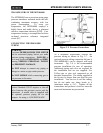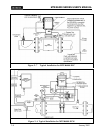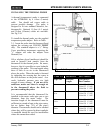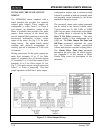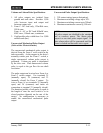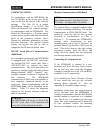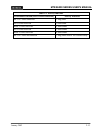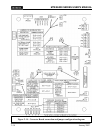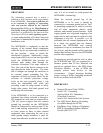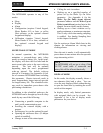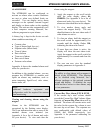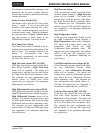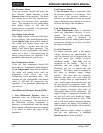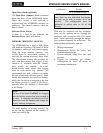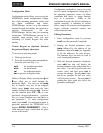
MTEK6000 SERIES USER'S MANUAL
January 2002 2-15
GROUNDING
The information presented here is merely a
guideline to help customers avoid surge damage
to the MTEK6000. None of these guidelines are
to be construed as replacing or superseding
rules and practices defined by the National
Electrical Code (NEC),
or the Classification of
Gas Utility Areas for Electrical Installations
guidelines, as published by the American Gas
Association (AGA) or other regulatory agency.
A sound understanding of Federal, State and
Local laws is fundamental to proper and legal
installation work.
The MTEK6000 is configured so that the
majority of the internal metal components
within the device are connected (common) to
the gas pipeline / meter to which the
instrument is attached. Additionally, a large
surge bypass MOV device has been provided
inside the MTEK6000 that provides an
alternate path (rather than through the
correctors electronics!) for surge current to
flow. One side of this device connects to the
pipe through the index & meter. The other
side is brought out through the enclosure to
an external copper grounding lug. The
separation of these two points allows for the
existence of cathodic protection voltage
levels on the pipe (typically about 1 volt
below the surrounding soil) while still
providing a path for surge current to safely
bridge these points, find earth ground, and
not damage the instrument.
If the MTEK6000 is to be connected to a
telephone line (either on-board or through a
PLI mounted in a safe area) or connected to a
UPS (AC power supply), then the external
ground lug provided on the MTEK6000
should be connected to earth ground. If the
unit is not making connection to the phone
co. lines, power co. lines, or other external
equipment, then connecting the unit to an
earth ground simply introduces a path for
surges that otherwise would not exist. In this
case it is of no benefit to earth ground the
MTEK6000’s external lug.
When the external ground lug of the
MTEK6000 is to be used, it should be
connected to a common ground rod (or "bed"
of grounding equipment) to which is securely
tied all other equipment chassis, metal
cabinets, and intrinsic ground brackets. Solid
copper ground wire or ground strapping of an
approved size and type must be used to tie this
equipment to the rod. If possible, it is far
preferable that all external equipment be tied
to a single site ground, that the distance
between the MTEK6000 and external
equipment is kept at a minimum (less than 20
feet is best), and the ground rod be located no
farther than halfway between the MTEK6000
and the other equipment.
If separate site grounds must be used, as when
the MTEK6000 and UPS are separated by a
distance greater than 20 feet, Metretek can
provide an optional device, the SPM (Surge
Protection Module). A pair of SPMs can
properly protect both devices in this
circumstance. Control drawings detailing
proper wiring of SPMs (including hazardous
areas) are included with the SPM.
REFERENCES
• National Electrical Code (NFPA):
Article 250 – Grounding
Articles 500 & 501- Hazardous
(Classified) Locations
Article 504 - Intrinsically Safe Systems
• The IAEI Soares' Book on Grounding
(Available through the NFPA)
• PolyPhaser Corp. Catalog of Lightning /
EMP & Grounding Solutions Minden,
Nevada (800) 325-7170



